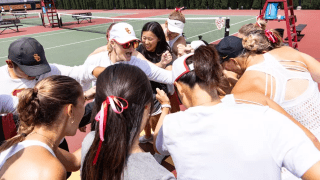In today’s evolving sports landscape, effective leadership is essential for aligning athletic excellence with practices that support the holistic well-being of all involved in various sports settings.
In the fall of 2026, USC Rossier will launch a new online Master of Education in Sports Administration and Leadership (MSAL) degree to equip current and aspiring leaders with the essential skills and knowledge to inspire teams and cultivate a culture of well-being and belonging beyond profit and sports wagering. Now more than ever, there is a need for human-centered leaders who can navigate challenges with integrity and create inclusive environments. Applications will open in late November 2025.
“Learning innovation meets the world of athletics in this new program. It will prepare graduate students to excel in various roles within the sports sector as well as empower them to make a lasting impact on athletes, communities and the broader field of sports,” said USC Rossier Dean Pedro Noguera. “We look forward to our graduate students joining us in shaping the future of sports leadership and discovering how they can be a catalyst for positive transformation in this exciting arena.”
Aligned with USC Rossier’s mission, the program develops human-centered leadership that addresses longstanding challenges found within youth leagues, collegiate and professional ranks. Responding to a growing need for values-driven sports leadership, the program’s core competencies include data-informed decision-making, strategic communication, ethical leadership and the capacity to design environments and policies where all individuals can thrive. “MSAL aims to equip leaders with the tools necessary to champion human-centered leadership, athlete well-being and meaningful change across sports contexts, fostering inclusive opportunities, experiences and outcomes,” added Assistant Professor Cory Buckner EdD ’17, faculty lead for the new degree program.
“In the wake of the pandemic, sports played a critical role in society,” said USC Rossier Professor of Clinical Education and USC Faculty Athletics Representative Alan Green. “MSAL will prepare leaders to utilize policies, budgets, staffing and data that serve athletes as people first, aligning competitive success with education, health and long-term development. Complementing this, Professor Kim Hirabayashi emphasized that the program is essential for leaders seeking research-based practices to promote development, learning, motivation and well-being in diverse and inclusive sports environments. “Our curriculum prepares graduates to ensure sport remains a force for positive development for everyone,” Hirabayashi said. Green and Hirabayashi are both on the MSAL curriculum design team.
As one of the instructors in the program, Buckner shared that the degree is open to current and emerging sports professionals, as well as those who have participated in sports and want to be part of the change.
Who is MSAL for and what will they gain?
“Anyone passionate about the holistic development, well-being and social impact of athletes and those who lead, coach and support them will find a home in this program, regardless of their athletic background,” Buckner said.
Fully taught online and composed of 24 units, the MSAL program can be completed in as little as one year full-time or at a flexible, part-time pace. Students complete five required courses and three elective courses. In addition, students will also have the flexibility to choose their electives from either the postsecondary athletic administration focus or the coaching focus, allowing them to tailor their educational experience to their career goals and interests.
Graduates of the program will gain the skills to blend theoretical understanding with practical applications, equipping and empowering them with the leadership skills needed to craft ethical policies, enact data-informed strategies and foster environments that prioritize holistic well-being and social justice in various sports settings.
“Moreover, with a growing demand for leaders who can navigate the complexities of sports organizations while prioritizing ethical leadership, this degree prepares graduates to pursue a variety of career paths,” added Buckner. “Those paths may include coaching, athletic administration, player development, community engagement, within professional, collegiate, amateur and youth sports.”
For individuals interested in learning more about the degree, visit USC Rossier Master of Education in Sports Administration and Leadership. Register today for informational webinars on Friday, Nov. 21 and Friday, Dec. 19.








